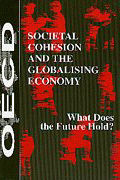As economic globalization runs its seemingly relentless course, the demands on OECD economies’ flexibility are set to increase further in the years to come. What kind of society will be able to cope with these pressures? How much and what kinds of adaptability will be required of individuals, institutions, and enterprises? What forces will hold OECD societies together in an environment shaped by intense international competition and fast-moving technological change? This book looks into the prospects for societal cohesion in tomorrow’s world. It assesses the long-run implications of continuing with the current set of policies, and examines ideas that may help societies strike a sustainable balance between economic flexibility and a cohesive social fabric.
The contributors are Wolfgang Michalski, Riel Miller, and Barrie Stevens of the OECD; Robert Z. Lawrence of the John F. Kennedy School of Government at Harvard University; Dennis J. Snower of the University of London; Henri Lepage of Institut Euro 92; and Claus Offe of Humboldt University of Berlin.
